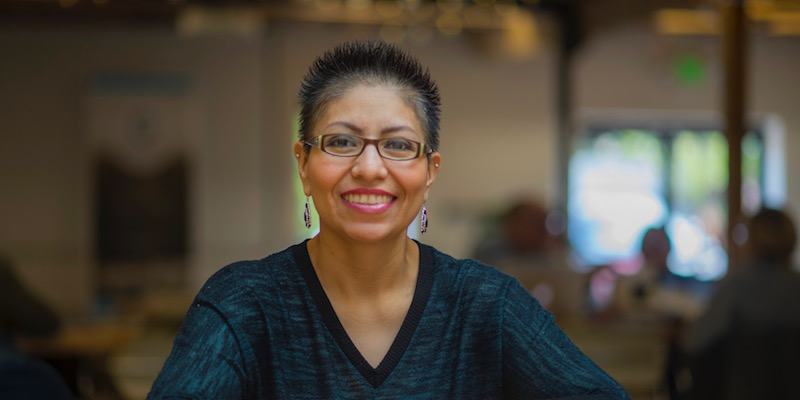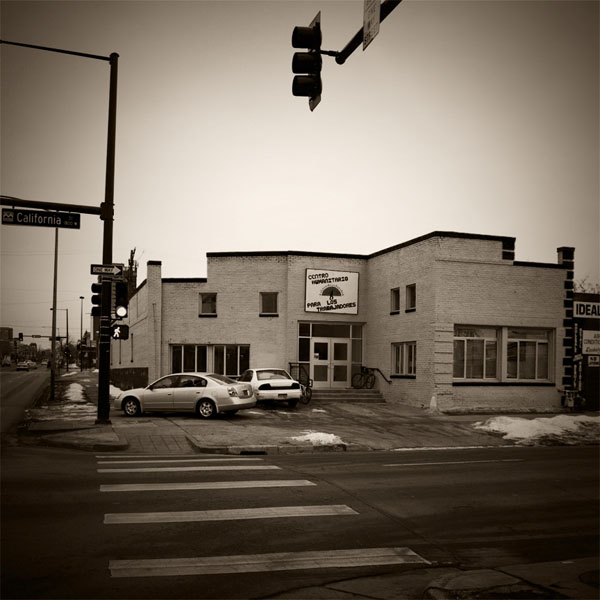Welcome to State of the Unions Week, where we look at the past, present, and future of organized labor in America.

When Ezzie Dominguez first arrived in Colorado in 2010 in search of a fresh start after an abusive first marriage, she had no idea how she would support herself and her five-year-old son. Her marriage had derailed many of the plans that the 28-year-old had for her life—including going to college, something she’d always planned on doing.
“I didn’t complete my schooling,” Dominguez tells me. “I didn’t complete a lot of the things I thought I’d be able to do.”
But then Dominguez heard an ad on the radio advertising a training on green cleaning methods at Centro Humanitario, a worker center in Denver. Dominguez, a frank, funny woman with seemingly boundless energy, figured maybe this was a job she could do without a degree.
Dominguez joined Centro Humanitario and took that green cleaning training. And then she took classes on how to care for children and the elderly. And leadership training. And mental-health first aid training. And training from the Occupational Safety and Health Administration. And computer skills training. And a career development training. She took trainings on cooking and catering through another local organization and started her own cleaning and catering businesses, staffed with workers from the center (as it’s frequently referred to).
When Dominguez’s new husband was detained by Immigration and Customs Enforcement in 2011, and she herself was diagnosed with cancer in 2012, the center connected her with other local non-profits that helped her get the treatment she needed and fight her husband’s deportation. In 2016, the center recommended her for a job as a regional organizer at the Colorado Immigrant Rights Coalition, where she spent two years advocating for local recipients of the Deferred Action for Childhood Arrivals program and the area’s immigrant community. That same year, CIRC and the center partnered up to send Dominguez to a series of the National Domestic Workers Association’s Strategic Organizing Leadership trainings all over the country.
Today, Dominguez, who is still undergoing cancer treatment, works at the Posner Center, a Colorado non-profit focused on international development, and continues to run her businesses on the side. She and her husband welcomed a baby boy nine months ago, and she’s working on a B.A. in organizational development. It is not an exaggeration to say that Centro Humanitario transformed Dominguez’s life.
“You know, I hear people say, oh, these trainings don’t serve a purpose, what can it really change, but that hasn’t been true for me,” Dominguez says. “I had no education, and I took this one little step … I didn’t think that I could lead people fighting for DACA, for deportation waivers, for change, and then I woke up one morning and realized that I was doing it.”

Centro Humanitario sits on a busy corner in a rapidly gentrifying Denver neighborhood, surrounded by shiny new mid-rise condo buildings and construction sites churning out still more mid-rise condo buildings. The one-story brick building is painted light purple and decorated along one side with an elaborate mural. On the front, a huge banner reads “Day Laborers Available Here.”
The center was founded in 2002. At the time, the American Friends Service Committee, a local non-profit, had been surveying day laborers in homeless shelters and on the street corners where many waited on a daily basis for work. They all expressed a desire for a safe, sheltered place to congregate during the day, and for better access to good-paying jobs. The survey also revealed how profoundly vulnerable these men—many of them undocumented and uneducated—were. They were regularly subjected to difficult working conditions and wage theft. Employers, aware that these laborers had little recourse, would pick up a worker, put them to work for eight or 10 hours, and pay them only a few bucks an hour.

(Photo: Posner Center)
Over the years, the center has grown considerably and expanded its service offerings. As Ezzie Dominguez’s story illustrates, it offers trainings on various topics to its members, including ESL classes, computer classes, leadership trainings, and all-important “Know Your Rights” trainings designed to give workers the information they need to ensure they’re paid fairly. They’ve helped members start worker collectives. Members (who pay dues of $15 a year) are provided with a picture ID card (the only form of identification some possess), can rent lockers at the facility to store documents and food, and can use the center’s computers and small kitchen during the day. It also serves as an unofficial job placement center of sorts—employers who agree to the center’s rules about a minimum wage ($15 per hour) and fair treatment can find willing workers there.
The center, which is now an affiliate of both the National Day Laborers Organization Network and the National Domestic Workers Association, is actively seeking to organize domestic workers as well.
“We’re really focused right now on activating and engaging and building a base of domestic workers in Denver,” explains Sarah Shikes, the center’s executive director.
Like most worker centers, Centro Humanitario has also participated in lobbying and activism on a variety of issues. The organization played a central role in the passage of a 2014 bill, the Wage Protection Act, that aims to prevent and better address wage theft in Colorado. It facilitates a volunteer wage-theft Direct Action Team and maintains close connections with other Denver-area lawyers who handle such cases. They’ve worked with a local political science professor on an exhaustive study of the conditions faced by domestic workers in Colorado.
Many of the center’s members are themselves undocumented or have undocumented family members, so some participate in protests or other actions on immigration, usually in cooperation with other local immigrant rights groups. Interest in those kinds of protests, however, has fallen off since Donald Trump was elected.
“They’re asking a lot more about whether security, or ICE, will be at the rallies,” says Nancy Rosas, the center’s leadership development and campaign director.
Centro Humanitario’s activities are typical of worker centers around the country.
“They tend to have a broader agenda than some typical unions had,” says Janice Fine, a professor at Rutgers University who has been studying alt-labor organizations since the 1990s. “So, for example, because so many worker centers are based in immigrant communities, many of them have made immigration policy and immigrant rights a central part of what they do. Also, because many of them are based in communities of workers who are newcomers to the United States, sometimes they have a big focus on immigrant integration, whether that’s people learning about the public school system, or public safety system, or learning English, or learning other kinds of occupational skills or computer skills.”

As traditional unions have hemorrhaged members and power and around the country, worker centers have popped up all over to fill the void. When Fine, the Rutgers professor, first started tracking worker centers back in 1992, there were only five of them. Today, there are over 260.
These organizations have won some big, high-profile victories. The Florida-based Coalition of Immokalee Workers, for example, successfully waged a campaign to increase wages and conditions for agricultural workers. And the National Domestic Workers Association, which partners with local worker centers and other small organizations all over the country, has been a key player in the passage of a “Domestic Workers Bill of Rights” in several states. (This success has not gone unnoticed by the historical foes of traditional unions.)

(Photo: Centro Humanitario)
At the same time, these organizations face challenges different from those of traditional unions. Many of them, like the center, rely primarily on non-profits for funding, which can be a particularly unstable funding stream. And while Ezzie Dominguez’s story illustrates the possible, many of the center’s members have much more modest goals.
On a chilly recent Monday morning in February, I visited the center to observe a weekly member meeting. Eight men sat around long tables in the facility’s main room as Nancy Rosas and Johnathon Prather, the center’s worker center and outreach coordinator, reviewed some policy rules and discussed an upcoming marketing campaign. Someone had made bacon earlier in the morning—the kitchen is a useful perk for members who reside in homeless shelters—and the smell hung in the air.
After the meeting concluded, the members spread out, finding ways to occupy themselves while they waited for jobs. A few sat down at the tables to have a snack. A few others headed to the computers at the back of the room to check email or search for jobs online.
One member, a middle-aged man with short black hair named Chris, shook his head when I asked him whether he thought things were getting better for average workers in this country. “Everything’s a set-up—the whole government is a set-up, it’s all rigged, it doesn’t matter who’s in power,” he says.
That feeling of hopelessness, even abandonment, is what makes the center so valuable to people like Chris and Ezzie Dominguez. As Chris puts it: “They’re doing something, at least.”



